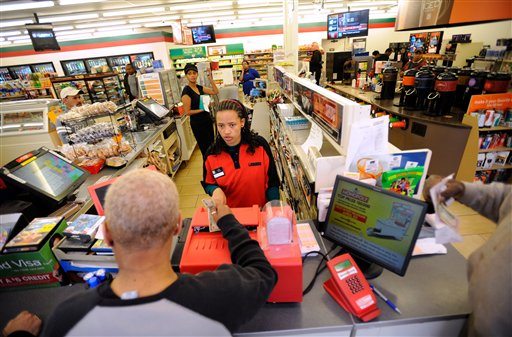ST. LOUIS (AP) -- Congratulations, Mega Millions winners! You've just won the biggest lottery in history! Move over Bill Gates and Warren Buffett!
Not so fast, Richie Rich.
There's no doubt that you're now each a member of the 1 percent. A life of comfort and leisure awaits, and managed wisely, it just might await your friends and family for generations to come.
Let's just not get carried away.
Had you won the whole pot, and invested the $300 million conservatively, Steve Fazzari, an economics professor at Washington University in St. Louis, said you could have expected to collect a nice "salary" of about $7 million "after taxes every year for the rest of your life and the rest of the life of your heirs."
Put another way, that's $19,000 a day. Forever. And even a one-third share of that is pretty sweet. "If you put it in perspective, you're pretty rich," Fazzari said.
It's more than enough to join up with the 1 percent, which the Congressional Budget Office pegged as households with incomes that average more than about $350,000 a year.
But it's still not all THAT much, at least according those buzzkills at Forbes. Just 30 years ago, the total after-taxes take of $300 million would have been more than enough to land a single winner on the magazine's annual list of the 400 richest Americans. In 2011, you would have needed $1.05 billion to tie four others for last place on a list topped by Gates.
In fact, your $100 million isn't even two-tenths of 1 percent of Gates' estimated $61 billion net worth. Using Fazzari's math on conservative investing, the Microsoft co-founder can expect to bring in an annual salary of $1.4 billion -- or 14 times your share of the historic jackpot.
But that's Bill Gates, America's richest man. Surely you'll be the richest guy on your block?
Perhaps, but not in the city centers of New York, Chicago and Los Angeles. In Chicago alone, Forbes says there are 18 billionaires, including six members of one family.
Even in a smaller city such as St. Louis, you're likely to find yourself a handful of zeros from the top: Under the Gateway Arch, the big money belongs to Enterprise Rent-A-Car's Jack Taylor and his family. They're worth an estimated $9 billion.
But none of that matters, right? So what if there are hundreds of billionaires out there whose wealth makes yours look like that of a pauper, or that there are limits you never imagined facing to a jackpot you could ever imagine winning. Surely that $100 million will at least solve all your cares and provide a lifetime of happiness.
Yeah, not so much.
"After they win the jackpot, most of them self-destruct and they end up much more unhappy than they were before," Dr. Tom Manheim, who offers financial therapy in Solana Beach, Calif. "It's really kind of a sad state of our economy where we think that money, once again is going to bring us happiness, and it doesn't."
So, uh, yeah, congratulations, we guess, to the Mega Millions winners.
(And no, those of us who didn't win aren't bitter. Not one little bit.)



